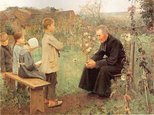 The Heidelberg Catechism: Lord's Day 26 69. Question: How does holy baptism signify and seal to you that the one sacrifice of Christ on the cross benefits you? Answer: In this way: Christ instituted this outward washing[1] and with it gave the promise that, as surely as water washes away the dirt from the body, so certainly His blood and Spirit wash away the impurity of my soul, that is, all my sins.[2] [1] Matt. 28:19. [2] Matt. 3:11; Mark 16:16; John 1:33; Acts 2:38; Rom. 6:3, 4; I Pet. 3:21. 70. Question: What does it mean to be washed with Christ's blood and Spirit? Answer: To be washed with Christ's blood means to receive forgiveness of sins from God, through grace, because of Christ's blood, poured out for us in His sacrifice on the cross.[1] To be washed with His Spirit means to be renewed by the Holy Spirit and sanctified to be members of Christ, so that more and more we become dead to sin and lead a holy and blameless life.[2] [1] Ez. 36:25; Zech. 13:1; Eph. 1:7; Heb. 12:24; I Pet. 1:2; Rev. 1:5; 7:14. [2] John 3:5-8; Rom. 6:4; I Cor. 6:11; Col. 2:11, 12. 71. Question: Where has Christ promised that He will wash us with His blood and Spirit as surely as we are washed with the water of baptism? Answer: In the institution of baptism, where He says: Go therefore and make disciples of all nations, baptizing them in the name of the Father and of the Son and of the Holy Spirit (Matthew 28:19). He who believes and is baptized will be saved, but he who does not believe will be condemned (Mark 16:16). This promise is repeated where Scripture calls baptism the washing of regeneration and the washing away of sins (Titus 3:5; Acts 22:16).
0 Comments
 The Heidelberg Catechism: Lord's Day 25 65. Question: Since then faith alone makes us share in Christ and all His benefits, where does this faith come from? Answer: From the Holy Spirit,[1] who works it in our hearts by the preaching of the gospel,[2] and strengthens it by the use of the sacraments.[3] [1] John 3:5; I Cor. 2:10-14; Eph. 2:8; Phil. 1:29. [2] Rom. 10:17; I Pet. 1:23-25. [3] Matt. 28:19, 20; I Cor. 10:16. 66. Question: What are the sacraments? Answer: The sacraments are holy, visible signs and seals. They were instituted by God so that by their use He might the more fully declare and seal to us the promise of the gospel.[1] And this is the promise: that God graciously grants us forgiveness of sins and everlasting life because of the one sacrifice of Christ accomplished on the cross.[2] [1] Gen. 17:11; Deut. 30:6; Rom. 4:11 [2] Matt. 26:27, 28; Acts 2:38; Heb. 10:10. 67. Question: Are both the Word and the sacraments then intended to focus our faith on the sacrifice of Jesus Christ on the cross as the only ground of our salvation? Answer: Yes, indeed. The Holy Spirit teaches us in the gospel and assures us by the sacraments that our entire salvation rests on Christ's one sacrifice for us on the cross.[1] [1] Rom. 6:3; I Cor. 11:26; Gal. 3:27. 68. Question: How many sacraments has Christ instituted in the new covenant? Answer: Two: holy baptism and the holy supper.[1] [1] Matt. 28:19, 20; I Cor. 11:23-26.  The Heidelberg Catechism: Lord's Day 19 50. Question: Why is it added, ‘And sits at the right hand of God’? Answer: Christ ascended into heaven to manifest Himself there as Head of His Church,[1] through whom the Father governs all things.[2] [1] Eph. 1:20-23; Col. 1:18. [2] Matt. 28:18; John 5:22, 23. 51. Question: How does the glory of Christ, our Head, benefit us? Answer: First, by His Holy Spirit He pours out heavenly gifts upon us, His members.[1] Second, by His power He defends and preserves us against all enemies.[2] [1] Acts 2:33; Eph. 4:7-12. [2] Ps. 2:9; 110:1, 2; John 10:27-30; Rev. 19:11-16. 52. Question: What comfort is it to you that Christ will come to judge the living and the dead? Answer: In all my sorrow and persecution I lift up my head and eagerly await as judge from heaven the very same person who before has submitted Himself to the judgment of God for my sake, and has removed all the curse from me.[1] He will cast all His and my enemies into everlasting condemnation, but He will take me and all His chosen ones to Himself into heavenly joy and glory.[2] [1] Luke 21:28; Rom. 8:22-25; Phil. 3:20,21; Tit. 2:13, 14. [2] Matt. 25:31-46; I Thess. 4:16, 17; II Thess. 1:6-10.  The Heidelberg Catechism: Lord's Day 18 46. Question: What do you confess when you say, He ascended into heaven? Answer: That Christ, before the eyes of His disciples, was taken up from the earth into heaven,[1] and that He is there for our benefit[2] until He comes again to judge the living and the dead.[3] [1] Mark 16:19; Luke 24:50, 51; Acts 1:9-11. [2] Rom. 8:34; Heb. 4:14; 7:23-25; 9:24. [3] Matt. 24:30; Acts 1:11. 47. Question: Is Christ, then, not with us until the end of the world, as He has promised us?[1] Answer: Christ is true man and true God. With respect to His human nature He is no longer on earth,[2] but with respect to His divinity, majesty, grace, and Spirit He is never absent from us.[3] [1] Matt. 28:20. [2] Matt. 26:11; John 16:28; 17:11; Acts 3:19-21; Heb. 8:4. [3] Matt. 28:18-20; John 14:16-19; 16:13. 48. Question: But are the two natures in Christ not separated from each other if His human nature is not present wherever His divinity is? Answer: Not at all, for His divinity has no limits and is present everywhere.[1] So it must follow that His divinity is indeed beyond the human nature which He has taken on and nevertheless is within this human nature and remains personally united with it.[2] [1] Jer. 23:23, 24; Acts 7:48, 49. [2] John 1:14; 3:13; Col. 2:9. 49. Question: How does Christ's ascension into heaven benefit us? Answer: First, He is our Advocate in heaven before His Father.[1] Second, we have our flesh in heaven as a sure pledge that He, our Head, will also take us, His members, up to Himself.[2] Third, He sends us His Spirit as a counter-pledge,[3] by whose power we seek the things that are above, where Christ is, seated at the right hand of God, and not the things that are on earth.[4] [1] Rom. 8:34; I John 2:1. [2] John 14:2; 17:24; Eph. 2:4-6. [3] John 14:16; Acts 2:33; II Cor. 1:21, 22; 5:5. [4] Col. 3:1-4.  The Heidelberg Catechism: Lord's Day 17 45. Question: How does Christ's resurrection benefit us? Answer: First, by His resurrection He has overcome death, so that He could make us share in the righteousness which He had obtained for us by His death.[1] Second, by His power we too are raised up to a new life.[2] Third, Christ's resurrection is to us a sure pledge of our glorious resurrection.[3] [1] Rom. 4:25; I Cor. 15:16-20; I Pet. 1:3-5. [2] Rom. 6:5-11; Eph. 2:4-6; Col. 3:1-4. [3] Rom. 8:11; I Cor. 15:12-23; Phil. 3:20, 21.  The Heidelberg Catechism: Lord's Day 14 35. Question: What do you confess when you say: He was conceived by the Holy Spirit, born of the virgin Mary? Answer: The eternal Son of God, who is and remains true and eternal God,[1] took upon Himself true human nature from the flesh and blood of the virgin Mary,[2] through the working of the Holy Spirit.[3] Thus He is also the true seed of David,[4] and like His brothers in every respect,[5] yet without sin.[6] [1] John 1:1; 10:30-36; Rom. 1:3; 9:5; Col. 1:15-17; I John 5:20. [2] Matt. 1:18-23; John 1:14; Gal. 4:4; Heb. 2:14. [3] Luke 1:35. [4] II Sam. 7:12-16; Ps. 132:11; Matt. 1:1; Luke 1:32; Rom. 1:3. [5] Phil. 2:7; Heb. 2:17. [6] Heb. 4:15; 7:26, 27. 36. Question: What benefit do you receive from the holy conception and birth of Christ? Answer: He is our Mediator,[1] and with His innocence and perfect holiness covers, in the sight of God, my sin, in which I was conceived and born.[2] [1] I Tim. 2:5, 6; Heb. 9:13-15. [2] Rom. 8:3, 4; II Cor. 5:21; Gal. 4:4, 5; I Pet. 1:18, 19.  The Heidelberg Catechism: Lord's Day 10 27. Question: What do you understand by the providence of God? Answer: God's providence is His almighty and ever present power,[1] whereby, as with His hand, He still upholds heaven and earth and all creatures,[2] and so governs them that leaf and blade, rain and drought, fruitful and barren years, food and drink, health and sickness, riches and poverty,[3] indeed, all things, come not by chance[4] but by His fatherly hand.[5] [1] Jer. 23:23, 24; Acts 17:24-28. [2] Heb. 1:3. [3] Jer. 5:24; Acts 14:15-17; John 9:3; Prov. 22:2. [4] Prov. 16:33. [5] Matt. 10:29. 28. Question: What does it benefit us to know that God has created all things and still upholds them by His providence? Answer: We can be patient in adversity,[1] thankful in prosperity,[2] and with a view to the future we can have a firm confidence in our faithful God and Father that no creature shall separate us from His love;[3] for all creatures are so completely in His hand that without His will they cannot so much as move.[4] [1] Job. 1:21, 22; Ps. 39:10; James 1:3. [2] Deut. 8:10; I Thess. 5:18. [3] Ps. 55:22; Rom. 5:3-5; 8:38, 39. [4] Job 1:12; 2:6; Prov. 21:1; Acts 17:24-28. |
The Heidelberg
|
 RSS Feed
RSS Feed
